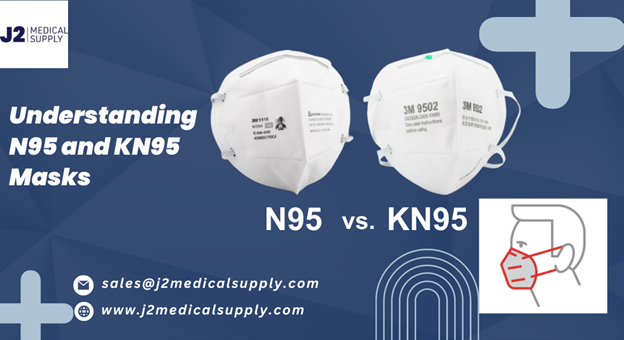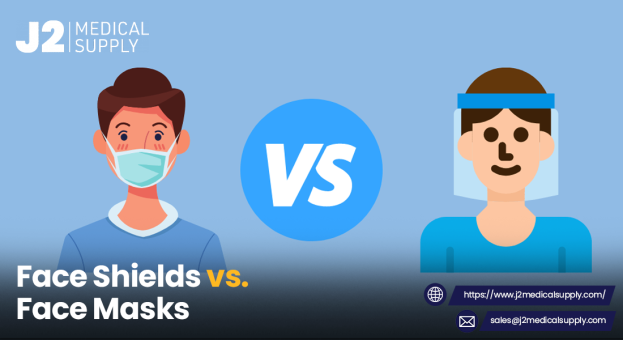As the world grapples with the challenges posed by COVID-19, face masks have emerged as a vital tool in curbing the spread of the virus. Masks, particularly N95 and KN95 masks, offer a higher level of protection due to their filtration efficiency and snug fit. Understanding the nuances of these masks is essential to make informed decisions regarding their usage.
A Closer Look at N95 and KN95 Masks for Respiratory Defense
N95 and KN95 masks are designed to filter out airborne particles, including tiny respiratory droplets carrying the virus. The “N” in N95 stands for “not resistant to oil,” indicating that these masks are unsuitable for environments with oil-based aerosols. On the other hand, the “KN” in KN95 denotes that the mask meets the Chinese standard for filtration efficiency.
The Importance of Face Masks in COVID-19 Protection | N95 and KN95 Masks
Face masks have proven to be effective in reducing the transmission of COVID-19. They create a barrier that prevents respiratory droplets, which may contain the virus, from being released into the air. By wearing masks, we protect ourselves and contribute to the collective effort to safeguard public health.
N95 Masks: Features and Benefits
N95 masks are widely used in healthcare settings and offer high filtration efficiency. They are designed to provide a secure seal around the nose and mouth, minimizing the risk of inhaling airborne particles. N95 masks undergo rigorous testing to ensure effectiveness and are certified by regulatory bodies such as the National Institute for Occupational Safety and Health (NIOSH).
KN95 Masks: Features and Benefits
Like N95 masks, KN95 masks offer a high filtration efficiency. These masks are manufactured following the Chinese standard, ensuring their quality and effectiveness. KN95 masks have a tight-fitting design, providing a reliable barrier against respiratory droplets.
Differences Between N95 and KN95 Masks
While N95 and KN95 masks share similarities in filtration efficiency and effectiveness, fundamental differences exist. One significant distinction is the certification process. N95 masks undergo testing and certification by NIOSH, while KN95 masks are certified by authorized Chinese agencies. Additionally, there may be slight variations in design and performance standards between the two types of masks.
Choosing the Right Mask | N95 and KN95 Masks
When selecting the appropriate personal protective equipment (PPE) gear, such as masks, it is crucial to understand the specific requirements of your environment. N95 masks are often recommended in healthcare settings due to their high filtration capabilities. KN95 masks provide an effective alternative for general public use, balancing protection and accessibility.
Factors to Consider when Selecting N95 and KN95 Mask
When selecting the most suitable N95 or KN95 masks for your needs, it is essential to consider several factors to ensure optimal protection and comfort.
● Filtration Efficiency
Look for masks with high filtration efficiency, typically indicated by a percentage of 95% or higher. This ensures that many airborne particles, including respiratory droplets carrying the virus, are filtered out.
● Fit and Seal
Proper fit and seal are essential for the mask to prevent the entry of airborne particles effectively. A snug fit around the nose, mouth, and chin, without any gaps, is crucial. Covers with adjustable nose clips and ear loops can help achieve a secure fit.
● Comfort
Masks should be comfortable to wear for extended periods. Consider the materials used and features like adjustable straps, padded nose bridges, and breathability. A comfortable mask is more likely to be worn consistently, ensuring continuous protection.
● Certifications
Check for proper certifications and approvals from reputable regulatory bodies, such as NIOSH for N95 masks or authorized agencies for KN95 masks. These certifications validate the mask’s quality, performance, and compliance with safety standards.
● Availability and Supply
Evaluate the availability and supply of N95 and KN95 masks. During periods of high demand, it is vital to ensure a reliable supply of masks, especially for healthcare providers and essential workers who require them regularly.
● Cost
Consider the cost-effectiveness of the masks without compromising quality. While high-quality masks may be slightly more expensive, they offer superior protection and durability, making them a worthwhile investment.
● Disposable vs. Reusable
Determine whether disposable or reusable masks are more suitable for your specific needs. Disposable masks are convenient for single-use scenarios, while reusable masks can be washed and reused, reducing waste and long-term costs.
● Regulatory Compliance
Ensure the masks meet regulatory standards, such as filtration efficiency, fluid resistance, and flammability. Compliance with these standards ensures that the masks provide the intended level of protection.
DIY N95 Mask: Is It Effective?
With the increased demand for N95 masks during the pandemic, some individuals have resorted to creating DIY versions. While these homemade masks may offer some protection, they guarantee a different filtration efficiency and fit than commercially manufactured masks. It is recommended to use certified N95 or KN95 masks for optimal protection.
The Impact of the COVID-19 Omicron Variant
The emergence of new variants, such as the COVID-19 Omicron variant, highlights the importance of maintaining proper mask usage. The Omicron variant has raised concerns due to its increased transmissibility. To mitigate the risk, it is crucial to continue wearing N95 or KN95 masks, follow public health guidelines, and stay informed about the latest developments in virus prevention.
Proper Usage and Maintenance of N95 and KN95 Masks
To ensure the effectiveness of N95 and KN95 masks, it is essential to follow proper usage and maintenance guidelines. With no gaps, masks should be worn securely over the nose and mouth. Avoid touching the mask while wearing it, and dispose of disposable masks afterward. Reusable covers should be cleaned and stored according to the manufacturer’s instructions to maintain integrity.
N95 and KN95 masks play a crucial role in protecting individuals from COVID-19 and reducing the transmission of the virus. Understanding the differences between these masks, their features and benefits, and the factors to consider when selecting the appropriate mask is vital for making informed decisions. By prioritizing mask usage and following recommended guidelines, we can contribute to the collective effort to overcome the challenges posed by the pandemic. Whichever side you may weigh more, fear not, for J2 Medical Supply has you covered for all masks in all shapes and sizes. So head over to our website and view our collection now!




